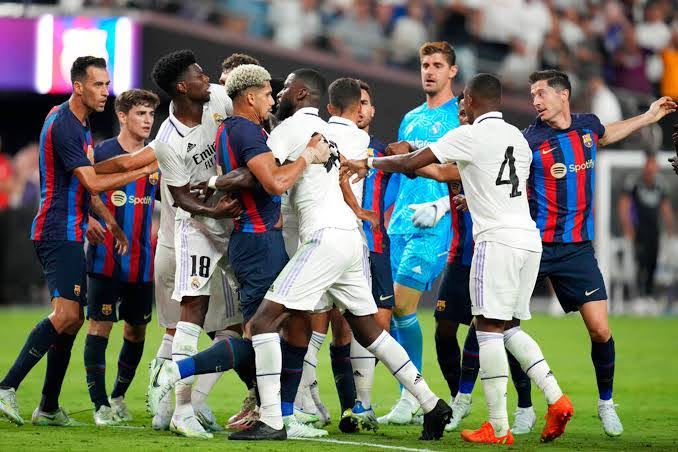The Economic Impact of Major Football Events
Football tournaments of global magnitude, such as the World Cup and UEFA Champions League, extend far beyond the realm of sports, leaving an indelible mark on the economies of host countries.
تصديات اندي لونين من هنا 👇👇

This article explores the multifaceted economic impact of hosting major football events, shedding light on the diverse ways in which nations stand to benefit.
Introduction
In the world of sports, few events rival the global spectacle of major football tournaments.
Beyond the thrill of competition and the roar of the crowd, these events wield significant economic influence, transforming host nations into vibrant hubs of activity.
Tourism Boom and Hospitality Sector
One of the primary drivers of economic growth during major football tournaments is the surge in tourism. Host countries experience an influx of football enthusiasts from around the globe, leading to a spike in demand for accommodation, transportation, and entertainment services. The hospitality sector witnesses unprecedented prosperity as hotels, restaurants, and local businesses capitalize on the surge in visitors.

Infrastructure Development and Investment
Hosting a major football event necessitates substantial investments in infrastructure. Stadiums, transportation networks, and public spaces undergo upgrades, creating a lasting legacy for the host nation. These developments not only enhance the overall experience for spectators but also contribute to long-term economic growth by fostering improved connectivity and urban development.
Media Rights and Broadcasting Revenue
The global appeal of major football tournaments translates into a lucrative market for media rights and broadcasting. Television networks and digital platforms vie for the broadcasting rights, injecting substantial funds into the event and providing a platform for sponsors to reach a vast international audience. The revenue generated from these rights significantly contributes to the overall economic impact.
Boost to Local Businesses and Merchandising
Local businesses, particularly those in proximity to the tournament venues, witness a surge in customer traffic. From souvenir shops to restaurants, the tournament becomes a catalyst for increased sales. Additionally, the sale of merchandise, including team jerseys, scarves, and other memorabilia, skyrockets, providing a direct financial boost to both the teams and the host nation.
Job Creation and Volunteer Opportunities
The hosting of major football events generates a plethora of job opportunities across various sectors. From event management to hospitality, security, and catering, the demand for manpower spikes. Moreover, a significant number of volunteers contribute their time and skills, fostering a sense of community engagement and leaving a positive social impact.
Cultural Exchange and Diplomacy
Football tournaments serve as a melting pot of cultures, fostering international goodwill and diplomatic ties. The mingling of diverse fanbases creates an atmosphere of camaraderie, showcasing the host nation’s hospitality on a global stage. This cultural exchange not only enhances the nation’s reputation but also opens doors for future collaborations and partnerships.
Future Implications and Sustainability
Looking ahead, the economic legacy of hosting major football events carries lasting implications for host nations. The upgraded infrastructure, developed for the tournament, continues to benefit communities long after the final whistle. Sustainable practices employed during event planning, such as eco-friendly stadium designs and waste management strategies, contribute to a greener future.
Challenges and Mitigation Strategies
While the economic benefits are substantial, challenges such as cost overruns and potential underutilization of facilities post-event should not be overlooked. Nations are increasingly adopting strategic planning and risk mitigation measures to ensure that the long-term gains outweigh the initial investments. This includes repurposing stadiums for other sporting events, concerts, and community activities.
The Role of Technology in Maximizing Returns
In the digital age, leveraging technology is paramount to maximizing the economic returns of major football events. Smart stadiums, mobile applications, and virtual experiences enhance fan engagement and provide new revenue streams. The integration of cutting-edge technologies not only elevates the spectator experience but also attracts global sponsors seeking innovative marketing platforms.
Global Partnerships and Collaborations
Hosting major football events is not just a domestic affair; it’s an opportunity for global partnerships. Nations actively seek collaborations with international sponsors, businesses, and organizations to amplify the economic impact. Strategic alliances can extend beyond the tournament duration, fostering ongoing relationships that transcend borders and industries.
Measuring Success Beyond Economic Metrics
While economic indicators provide a tangible measure of success, the true impact of hosting major football events extends beyond monetary gains. Nations also benefit from enhanced visibility on the world stage, leading to increased tourism in the post-event period. The intangible benefits of national pride, cultural exchange, and diplomatic goodwill contribute significantly to a nation’s soft power.
Case Studies: Success Stories and Lessons Learned
Examining case studies of past host nations reveals a spectrum of outcomes. Successful hosts have not only reaped economic rewards but have also navigated challenges adeptly. Analyzing these cases offers valuable insights and lessons for future host nations, guiding them in optimizing the economic impact while minimizing potential pitfalls.
Conclusion: A Win-Win Scenario
In the grand tapestry of global sports, major football events emerge as powerful catalysts for positive change. When executed strategically, these tournaments create a win-win scenario, benefitting both the host nation and the global football community. As the world eagerly awaits the kickoff of the next major football extravaganza, the economic ripples it generates will continue to underscore the enduring significance of football on the global stage.
Conclusion
In conclusion, the economic impact of major football events extends far beyond the confines of the playing field. From boosting tourism and infrastructure development to creating job opportunities and fostering cultural exchange, hosting these tournaments is a strategic investment for nations aiming to showcase their capabilities on the global stage. As the world eagerly anticipates the next major football spectacle, the economic legacy left behind remains an integral part of the tournament’s enduring significance.
Sustainable Legacy and Community Development
Building a sustainable legacy goes beyond the physical infrastructure left behind. Successful host nations invest in community development projects that ensure a lasting positive impact on local residents. Initiatives such as youth sports programs, educational outreach, and cultural events contribute to a legacy that extends far beyond the tournament’s conclusion.
Balancing Commercialization and Fan Experience
As major football events become increasingly commercialized, finding the delicate balance between maximizing commercial opportunities and preserving the authentic fan experience is crucial. Host nations must navigate sponsorship agreements, fan zones, and branding without compromising the essence of the sport, ensuring that the tournament remains a source of joy for fans worldwide.
Adapting to Changing Trends: The Digital Frontier
The digital landscape continues to reshape the way fans experience football events. Embracing digitalization, including virtual ticketing, augmented reality experiences, and interactive content, not only enhances fan engagement but also presents new avenues for revenue generation. Host nations that harness the power of technology stand to gain a competitive edge in the evolving landscape of global sports entertainment.
Inclusivity and Social Impact
Major football events provide a platform to address social issues and promote inclusivity. Host nations are increasingly recognizing the importance of incorporating social impact initiatives, from promoting diversity and inclusion in the sport to addressing environmental concerns. These efforts contribute to a tournament’s broader significance as a force for positive change.
Global Fan Engagement: Beyond Borders
The global nature of football fandom creates opportunities for host nations to engage with fans worldwide. Leveraging social media, streaming platforms, and interactive fan experiences can amplify the event’s reach, making it a truly global celebration. This expanded reach not only enhances the economic impact but also fosters a sense of unity among diverse fan communities.
Resilience in the Face of Challenges
Unforeseen challenges, such as geopolitical events or public health crises, can impact the success of major football events. Building resilience into event planning involves contingency measures, crisis management strategies, and flexible approaches that ensure the tournament’s success even in the face of unexpected disruptions.
Continuous Innovation: The Key to Sustained Success
To maintain the economic momentum generated by major football events, host nations must embrace a culture of continuous innovation. This includes staying ahead of industry trends, adapting to changing consumer behaviors, and exploring new revenue streams. By fostering a spirit of innovation, host nations position themselves as dynamic players in the global sports and entertainment landscape.
Final Thoughts: Beyond the Final Whistle
In the grand scheme of things, hosting major football events is not just about the tournament itself; it’s about the enduring impact left on the host nation and the global community. As host nations prepare to welcome the world, they embark on a journey that goes beyond the final whistle—a journey of economic prosperity, cultural exchange, and the shared love for the beautiful game that transcends borders and unites nations.

